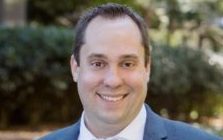“Conversations with Alumni” – Brian Waldman ’99
Chandler Pfaff, a freshman in the hotel school, gets a glimpse into the life of Brian Waldman ’99, Senior Vice President of Investments at Peachtree Hotel Group.
- To start off, would you mind sharing a bit about your background?
I’m originally from New York and grew up on Long Island. I worked in catering, which is what led me to the hotel school, so I always had a passion for food & beverage and real estate. I came to Cornell with the intention of pursuing F&B, but after taking a few finance and real estate classes I decided to switch gears, and I completed a dual concentration in finance and real estate. Currently, I’m married with 2 young kids, and my career has taken me back and forth from NYC to Atlanta.
- What did you enjoy most about your time at Cornell?
It was a fun time in life. I loved the hotel school, loved the people in the program, loved the friends I made. Collegetown was awesome and I really enjoyed all that Ithaca had to offer.
- What was your go-to restaurant or bar?
Well, it’s not around anymore, but Dunbar’s was my favorite. It was a little hole-in-the wall. It was a fun place.
- More to your present life, what’s your favorite thing to do in your free time?
Play with my kids. They’re at that age where they are tons of fun to be around.
They’re at that age where they are destroying everything, aren’t they?
Oh yes.
- Do you have a sports team that you follow, or anything that really interests you that you keep up with?
Growing up on Long Island I was a Mets fan and an Islanders fan. They haven’t done so well since I was a kid, so I haven’t been involved as much. Lately I’ve grown to appreciate college football.
You’re in a great place to be following college football, that’s for sure.
Absolutely. This past year our firm had tickets to go to the SEC conference championship game. It was a great time.
- One last personal question: if you had to recommend one place to vacation, where would it be?
Guanacaste, Costa Rica. It’s one of my favorite places in the world. It’s close to the rainforest, the beach, there’s horseback riding, good food, great people. We were on this resort and there were monkeys and animals everywhere. Definitely my favorite place to travel.
- Switching gears to your profession, let’s talk about your firm. Peachtree’s portfolio seems to be concentrated in the South. What is the strategy behind that market?
Peachtree is based in Atlanta and our primary strategy is to focus on premium-branded, select-service hotels. Since we are headquartered in the South, our investment portfolio tends be concentrated in the South because this is our backyard, so we know the market well. However, our loan portfolio is more diverse. I would say that in the next five years, our portfolio will remain about 80% in the southeast market, and 20% will be more opportunistic ventures.
- Why do you choose to invest primarily in premium-branded, select-service hotels?
There are five key elements of what we do: own; operating; renovate & develop; direct lending; and capital raising. Brand is important to Peachtree because there is a lot of value that comes from premium-branded hotels. Our heaviest concentration is in the Marriott and Hilton brand families with some Hyatt and IHG exposure. These are the most profitable investments for what we do, because we are a value-added investor.
Could you explain what that means, being a “value-add investor?”
Essentially, we like to find hotels that are broken, fix them, stabilize and then sell them for a profit—so we mostly do shorter-term investments. This is because we create the most value in our assets within the first few years of ownership by renovating and repositioning the hotel. Then we sell the asset and redeploy the profits into a different investment opportunity. So we use a buy, renovate, stabilize, and resell investment model.
- How has the real estate market evolved since you first entered the industry?
The prominence of select-service hotels has become much more prevalent. Not as many developers are building full-service hotels anymore. Brands are focusing more on select-service. We’re seeing more Courtyards and hotel brands at those price points popping up. I see this shift continuing because of customer preferences and development costs.
- What has been the most exciting transaction you have ever worked on?
Right after the big crash—around 08’ or ’09—I advised a pension fund with a $4 billion resort portfolio that had 17 tranches of debt. It involved the most sophisticated lenders and investors at the time and the real estate was amazing, but it was overleveraged. I found it very interesting to work on because of the complexity of the real estate, the capital structure, and the participants involved. Following the crash, it was one of the most high-profile workouts in the industry at the time.
- One last question: what advice do you have for students who want to pursue careers in real estate?
Freshman, you should take all the real estate classes you can early on and get as much summer internship experience as you can, because it helps you stand out.
In general, try to get involved in transactions as much as possible. There is so much that you learn from working on transactions. You should certainly look for opportunities where you are going to work with and be taught by smart people, but really seek out firms where you will get a lot of deal volume. Seeing a lot of transactions is how you get better experience, better understanding of real estate, and how you grow your career faster.
* * *
The Cornell Hotel Society Executive Board thanks the Cornell Hotel Society – Collegiate Chapter for initiating and conducting the “Conversations with Alumni” project.



